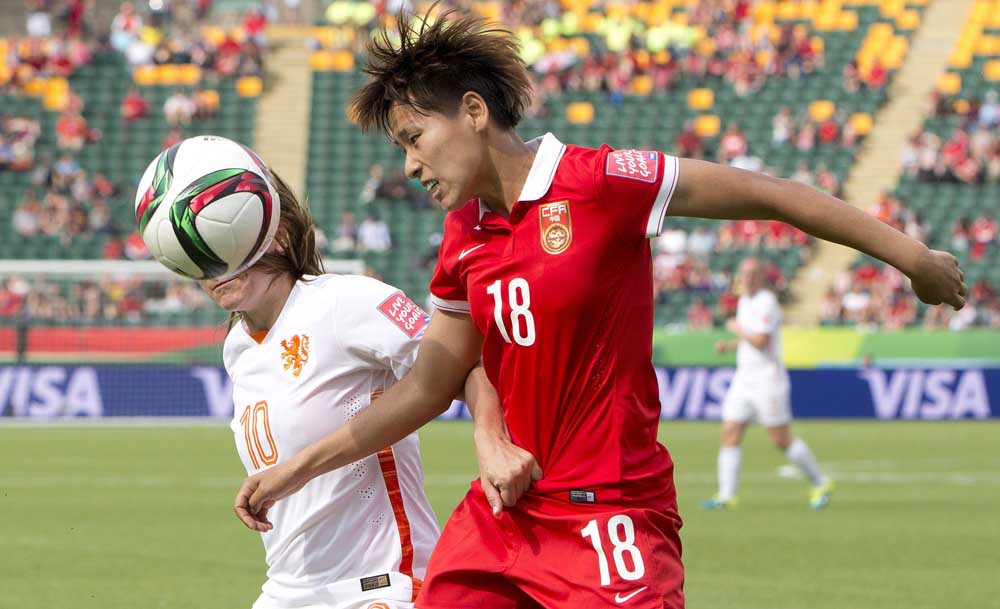America set to face rejuvenated China
Published 12:00 am Thursday, June 25, 2015

- Jason Franson / The Canadian PressChina’s Han Peng, right, looks to lead China over the United States during Friday’s Women’s World Cup quarterfinal.
EDMONTON, Alberta — Han Peng was 9 years old when China lost to the United States on penalty kicks in an epic championship match at the 1999 Women’s World Cup.
When she learned of the news the next day, Han, now 25, said: “I felt so disappointed. I thought to myself, if I were given the opportunity in the future, I will beat them.”
Now a starting midfielder, Han will get her long-awaited chance at redemption Friday, when a revived Chinese team faces the Americans in the World Cup quarterfinals in Ottawa, Ontario.
The Chinese women went into a long slide after the 1999 World Cup, failing to qualify for the 2011 tournament or the 2012 London Olympics.
The team went through coaches like rolls of tape. And China’s one-child policy has left many parents and schools reluctant to immerse children in sports, officials and former players said.
The resurgence of the women’s national team at this year’s World Cup in Canada reflects, in part, a new emphasis placed on men’s and women’s soccer in China at the highest levels of government.
Coach Hao Wei has restored the bloom to the Steel Roses, as the team is known, with a young, energetic roster that is fast, relentless, and thoroughly organized in defense.
And the U.S. will be without two starting midfielders, Megan Rapinoe and Lauren Holiday, who are suspended with two yellow cards each.
Enow Ngachu, the coach of Cameroon, which lost 1-0 to China in the round of 16, said he believed that China had a chance to defeat the Americans. China and the U.S. have not met in the World Cup since 1999, but they nonetheless play regularly and are familiar with each other. In their most recent meeting, they tied, 1-1, in December at a tournament in Brazil.
“I think they have one of the best defenses in this tournament,” Ngachu said of China, adding: “When they lose the ball, nearly all the Chinese players regroup themselves as fast as possible. You hardly find less than six players defending. If they keep on like that, they can create surprises.”
The U.S. has won the Women’s World Cup twice and never failed to reach at least the semifinals. Such expectations will put added pressure on the Americans, while the Chinese can play freely, having reached their goal of the quarterfinals, said Wang Shanshan, a forward who often plays on defense.
In the 12th minute Saturday, Wang scored on a volley during a superb corner-kick sequence to provide China’s decisive goal against Cameroon.
“It’s going to be a tossup for us, because I think the U.S. team will face bigger pressure than we do,” Wang said after the match, speaking through an interpreter. “We have already obtained our initial objective. We just need to go as far as we can. No more pressure.”
China lacks the technical and tactical sophistication — and the scoring punch — that it possessed in 1999. The star forward on that team, Sun Wen, was jointly named with Michelle Akers of the United States as the greatest women’s soccer players of the 20th century.
Still, China is a “very difficult team to put away,” said Tony DiCicco, who coached the U.S. to the 1999 title and declined an offer to coach China in 2004.
“They’ll be organized,” DiCicco said. “Their problem is the ability to score goals. They don’t have special players like they did.”
China did not have its head coach, either, for the first knockout-round game.
Hao, wearing a suit and tie, was ejected from the team’s final group match after interfering with New Zealand’s Ria Percival as she attempted a throw-in during second-half injury time. That odd bit of gamesmanship, which helped preserve a 2-2 tie and advancement in the tournament, cost Hao a suspension for China’s second-round match.
Tony Readings, the New Zealand coach, refused to shake hands with Hao after the incident and told reporters, “I would never go out of my way to do that to an opposing player.” He added, “We should always be backstage, not onstage.”
Hao watched Saturday’s match against Cameroon from the stands at chilly, rainy Commonwealth Stadium. But his assistant, Chang Weiwei, filled in more than capably as China trapped Cameroon in its spider-web defense. It has conceded three goals in four matches, while scoring four.
“We are in the top eight now,” Chang said. “We have a huge burden lifted off our shoulder. We believe in ourselves. We will become even more aggressive in our next match.”






